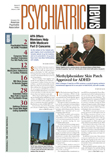Patients with “almost absent” or severe depression symptoms were more likely to receive adequate depression treatment in primary care settings than were those with mild or moderate symptoms, according to one study.
When depressive symptoms were either almost absent or extremely severe, 91 percent of patients were adequately managed by primary care physicians.
But when symptoms were mild or moderate, just 69 percent of primary care physicians received an adequate rating for the treatment, according to the findings, which appear in the December 2005 Psychiatric Services.
In addition, certain antidepressant medications were associated with a lower likelihood of adequate depression treatment.
Researchers gathered data on 389 patients between June and September 2002 as part of a quality-assurance project studying patients treated for depression in the primary care setting.
The patients were diagnosed and treated by primary care physicians at community-based private practices owned by the University of Pittsburgh Medical Center Community Medicine Inc.
One way researchers measured the adequacy of depression care for each patient was with the Antidepressant Treatment and History Form (ATHF), a validated instrument used to rate the adequacy with which primary care physicians treat patients with antidepressants, based on medication dosages and duration of medication trials.
They also gathered data from prospective tracking forms physicians completed for patients they were currently treating with an antidepressant and who were enrolled in the study. The forms gathered information on a number of variables, including the type and dosage of antidepressants used and the severity of a patient's depression.
In addition, physicians were asked to report what they planned to do next regarding each patient's treatment—that is, whether they would continue prescribing the same medication, switch to another antidepressant, change the dosage, or refer the patient to a mental health clinician.
Researchers designated treatment regimens as adequate when physicians decided to continue medication trials beyond four weeks; switched patients' medication due to side effects; when depression symptoms disappeared or were almost absent during treatment; or when physicians increased the dosage, added a medication, or referred patients to mental health specialists because of depression symptoms.
Patients were deemed to receive “inadequate” care when physicians continued treatment with a certain medication even though depressive symptoms were present after four weeks, or when physicians increased a dosage or added a new medication before the efficacy of the current one could be determined.
Researchers designated depression treatment as “equivocal” under two conditions: when there was no evidence of adverse effects and a physician switched a medication before an eight-week period, or when depressive symptoms were absent or almost absent and physicians increased patients' medication dosages, switched medications, or referred the patient to a mental health specialist.
“Adequacy ratings varied depending on the severity of [depressive] symptoms,” the report noted.
For patients with symptoms that physicians classified as absent, almost absent, or extremely severe, almost all (91 percent) received adequate depression management.
However, among those with symptoms classified as mild, mild to moderate, or moderate, only 69 percent received adequate depression management.
According to Eric Lenze, M.D., one of the study's investigators and an assistant professor of psychiatry at the University of Pittsburgh School of Medicine, when depressive symptoms fall into the range of almost absent or severe, the steps that primary care physicians take to manage the symptoms are much more “clear cut” than when those symptoms are mild or moderate.
There was also an association between the use of certain antidepressants and adequate ATHF scores. For instance, while 98 percent of those who received citalopram or paroxetine had adequate ATHF scores, just 80 percent of those who received fluoxetine and 29 percent of those who received sertraline did.
The investigators speculated that sertraline use was associated with lower ATHF scores because the ATHF required a daily dosage of 100 mg or more for an adequate rating, while the package insert recommended a daily dosage of 50 mg or more.
They noted that one limitation of the study may be that the sample of primary care physicians may not be “indicative of typical antidepressant treatment adequacy, because this group received a lecture about antidepressant treatment as part of the quality-assurance initiative.”
Lenze said the findings suggest that, on the whole, patients can be treated adequately with antidepressants—particularly selective serotonin reuptake inhibitors—in primary care settings. However, educating primary care physicians about the importance of treating mild depression is crucial, he noted.
“Even mild symptoms are active symptoms of an illness and need to be treated and managed,” he said.
Primary care physicians can also benefit from education about adequate dosage ranges, according to Lenze.
“Predictors of Adequacy of Depression Management in the Primary Care Setting” is posted at<ps.psychiatryonline.org/cgi/content/full/56/12/1524>.▪
Psychiatr Serv 2005 56 1524
